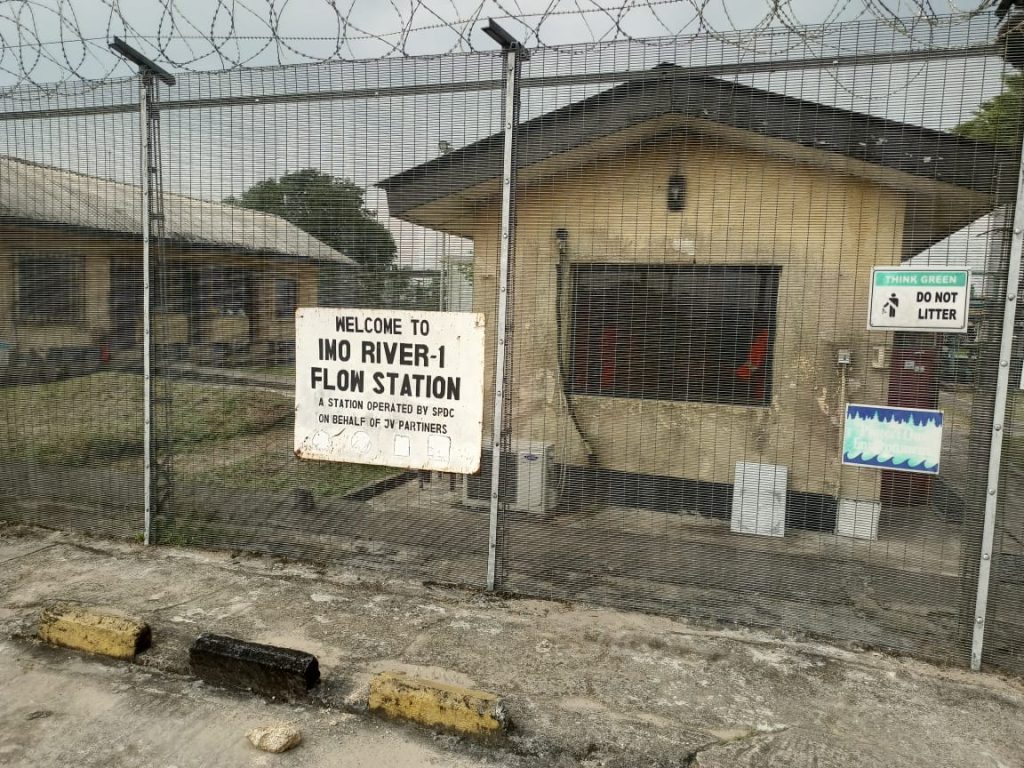Steve Oko
In this report, Steve Oko, digs into the plight of oil-bearing communities in Abia State and how what naturally ought to be a blessing, has cost them the serenity of their environment, aquatic life and fertility of their soil without bringing development.
Historical background:
In Abia State, crude oil is found mainly in Ukwa West Local Government Area; otherwise known as Asa Kingdom. The entire Asa kingdom comprising 36 villages make up Ukwa West Local government Area (LGA). Although some communities in the neighbouring Ukwa East (Ndoki clan) are said to also have large deposits of crude oil and gas, the black gold in those communities outside Asa for now, are capped.
Ukwa West shares boundaries with Ugwunagbo and Aba North LGAs in the northern flank; Ukwa East in the eastern part and Rivers State in the southern and western flanks. It has a population of 88,555 people and a land mass of 271 square kms according to the 2006 population census, although local sources claim they are well over a million people. Their major occupations include farming, and fishing until the effects of oil exploration made these occupations unrewarding ventures.
According to investigations, the following communities in Ukwa West: Owaza, Umuorie, Umuokwa, Umuahara, Uzuaka, and Obiakpu (wrongly spelt by the colonialists as Obipu), constitute the golden chicken that lays the golden egg, with Owaza accounting for about 80 per cent of the total oil production in the state. Owaza clan comprising four Autonomous Communities – Ipu West, Etitioha, Isi Etitioha, and Igiriukwu, according to local sources, has over 58 active oil wells. But the paramount traditional ruler of Etitioha Owaza, HRM Eze Obioma Nworgu, said oil wells in the kingdom, are well over 100. Oil exploration in Owaza was said to have started before 1956 when oil was first discovered in commercial quantity at Oloibiri, Ogbia LGA, in present day Bayelsa State.
Official record of oil wells in Abia
According to the Commissioner for Petroleum and Mineral Resources, Professor Joel Ogbonna, “recent data gathering by the Ministry identified four oil blocks: OML-11, OPLs 207, 208 and 234 in Abia State with a total of 53 wells, out of which only eight wells in OML-11 are currently on production from Imo River, Isimiri, and Oza fields.”
He further confirmed that besides the 53 wells in the four oil blocs, a set of about 100 capped wells also exist within Abia State that require additional information to properly assign them to any existing oil bloc. According to him, these fields have a combined booked resource volume of about 100 million barrels.
He also confirmed that Abia State had signed Memorandum of Agreement (MoA) with the Petroleum Technology Association of Nigeria (PETAN) “as well as jointly registered SPV that will be jointly owned by Abia State Government and PETAN as well as other private investors to enhance production of oil and gas assets within the state.” Abia State “stands to earn undivided 100% derivation revenue, company income tax, and other accrued income, opportunities and industrialization of its economy if any or all of these assets are confirmed producible, and are fully harnessed and developed.”
The Commissioner said a 5000-barrel crude per day modular oil refinery is under way at Owaza. According to him, the refinery is expected to come on stream by the first quarter of 2026.
“We are setting up Abia State Industrial Innovation Park in Owaza. We have acquired about 1933 hectares of land for it, and we’re ready to begin payment of compensation to the land owners. We hope to set up petrochemical company there and also convert gas flaring to wealth..”
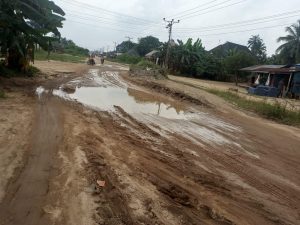
Ironically, the level of development in Owaza as well as other oil producing communities in Abia State, is a betrayal of its status and appellation as oil-producing area. From dilapidated road to lack of electricity; poor infrastructure to abandoned projects; there is so little to suggest they are part of the Niger Delta region.
Mr Fidelis Iheanacho, a retired Deputy Superintendent of Police, is the President General of the entire Owaza kingdom. He said that the people “have nothing to show” for the thousands of barrels of crude oil being extracted from their soil every day. According to him, the benefits of the crude oil are only enjoyed by outsiders. To buttress his point, he regretted that no Ukwa indigene owns an oil well.
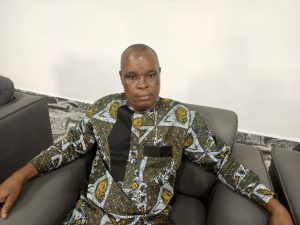
The PG accused both the various oil companies operating in the land as well as the Federal Government and the relevant agencies including the Nigeria Delta Development Commission, NDDC; and the Abia State Oil Producing Area Development Agency, ASOPADEC, of side-lining the oil-rich kingdom.
The eyesore and infrastructural decay at Owaza Secondary School as well as Owaza Central School, only confirm the claims by the PG and other community stakeholders. Owaza Secondary School which is directly opposite the first oil well in the kingdom has leaky roofs with premises overtaken by weeds. The story at the Central School is not different except that there is a new block of classrooms recently renovated by NDDC. A source at the primary school who pleaded not to be disclosed for fear of victimisation, said the school needed urgent attention.
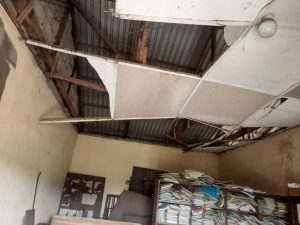
Some of the oil and gas companies operating in Owaza include Shell until it sold its assets to Nigeria Petroleum Development Company, NPDC; Nigeria Gas Company, and Total Oil. An industry source said about 40,000 barrels of crude oil are processed from NPDC OML II alone on daily basis.
On whether these oil companies dutifully discharge their corporate social responsibilities to the host communities, the PG said: “They are not doing enough,” adding that “the impact of oil exploration in Owaza is negative; all we get is environmental degradation and health hazards.” According to the PG, Owaza has little or nothing to show for the abundant crude oil in their land. For him, gas flaring is the only evidence with which they remember there is crude oil in their land.
He said: “The Federal Government is giving us zero per cent recognition. We have array of needs but nobody is showing concern. We don’t have electricity; pipe-borne water never existed in our community, and we are marginalised in federal establishments. Nobody from Owaza is on Federal scholarship.
“Since 1956 when oil exploration started here by Shell, I have never seen any federal presence in Owaza except gas flaring. We have complained but all that fell on deaf ears. In our land there was a large skills acquisition centre project started by the Federal Government around 2000 but it has since been abandoned. Similar projects started in other states at the same time have since been completed and put into good use.”
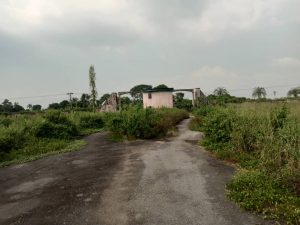
A visit to the project site on the road leading to Owaza from Obehie Junction, revealed that the project situated in about seven hectares of land, has been overgrown by grass. Cows also graze inside the premises littered with so many structures – some completed, others at different stages of completion.
The PG, however, commended Shell for establishing a cottage hospital at Owaza but regretted that since NPDC bought over the assets of Shell, it had completely abandoned the hospital to its fate.
“If not for Shell that established a cottage hospital managed under tripartite arrangement by the company, government and the community, the health sector would have been a complete mess here. Under the arrangement, Government supplies the skilled personnel (doctors and nurses); the community supplies unskilled workers that clean the hospital and provide other menial jobs, while Shell paid them and gave stipends to the skilled personnel. But since Shell left, NPDC has abandoned it.”
A visit to the hospital revealed that the premises was also overgrown with grass especially behind and around it. Some obsolete medical equipment were sighted while a demobilised Hummer bus ambulance donated by Shell was parked in front of the porch.
Precious Ugboaja is the Admin Officer in charge of the hospital. She decried the sorry state of facilities at the centre, confirming that for nearly two years that Shell left, NPDC, has not paid the unskilled workers, hence they withdrew their services. This, she said, was the reason the premises was unkempt. She also complained of reptile invasion.
Our water totally polluted, aquatic lives destroyed
“Our natural streams have been completely polluted by oil that floats on the surface. It’s not good for anything again. Growing up, fishing was fun. Palm tapping was a hubby. Some sold fresh palm wine, some fermented it to produce local gin called ‘Kai Kai,’ but today, fishing has gone extinct. The raffia palm trees which our fathers tapped are all dead. The soil yields nothing because of oil pollution. We now buy garri from Aba.”
Security agents fingered in oil bunkering
Multiple local sources in the course of the investigation, revealed how some bad eggs among security agents aid and abate oil bunkering. According to these sources, some unpatriotic security personnel usually strike a deal with ‘the boys’ involved in the illegal adventure, allowing them to operate unchallenged as long as they bring returns. They only go after the boys when they fail to abide by the terms of the illicit deal, or once in a while if they (security agents) come under pressure from their top hierarchy. Sadly, Nigeria has lost, and continues to lose so much revenue daily to these economic saboteurs and their accomplices who enrich themselves with the country’s commonwealth.
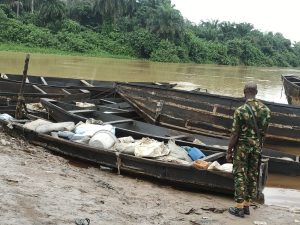
Despite sustained raids by various security agencies particularly the military, the menace has persisted. The General Officer, GOC, Commanding the 82 Division of the Nigerian Army, Enugu, Major Gen. Hassan Dada, has few times personally led the military raid against the scourge, but the battle is yet to end. In 2024 alone, the Army invaded illegal refineries in parts of Ukwa land where large quantities of crude oil and equipment used for illegal refining were destroyed. Over 14 boats laden with crude oil and refined products as well as vehicles were confiscated and also destroyed. Scores of suspects were arrested and handed over to the police for prosecution.
The retired DSP, indicted security operatives in illegal oil bunkering business in the area. According to him, any day security agents withdraw from the illegal business, it will come to a halt. Even though he noted that the menace might not be completely eradicated due to high rate of youth unemployment, he however believes that the oxygen sustaining the monster is the alleged collusion by unpatriotic elements among security operatives.
“Security agents sent to guard the oil installations, sometimes aid and abate oil bunkering, otherwise, the perpetrators won’t even attempt it. It’s because the security agents are neck-deep into it that makes it to thrive. They are all into it. They only act as if they are doing their job when somebody raises eyebrows. But afterwards, they continue.”
Corroborating the allegation, Mr Anthony Nwanete, the Headmaster of Migrate Fisherman Primary School in Umuahara Community, said: “any day security agents want to withdraw from oil bunkering, it will reduce by 95 per cent.” According to him, the remaining 5 per cent will fizzle out if the youths are empowered.
“They are all in it and that’s why it has not stopped. Yes, we know that some of the youths have criminal tendencies but they are not many. With the right empowerment those ones will quit.
Similarly, Mr Felix Eletuo, former Chairman of Obiakpu Community, said the involvement of security operatives in oil theft was the reason the illegality has refused to die. He admitted that constant raids by the military scare the local youths from the illegal business but said the alleged involvement of some security agents gives them morale booster.
But Mr Nwanete, gave another insight the menace might not completely stop. He revealed that leakage of oil from aging pipelines lures some undisciplined folks into scooping the liquid as one can hardly see money flowing and just pass by. He advised oil companies to stop using old pipes in funnelling crude oil as they rupture from time to time creating environmental pollution.
Both the Army and the Nigerian Police have denied any involvement in the illegality, challenging anyone with proof to present it. Police Public Relations Officer, PPRO, Abia State, Maureen Chinaka, said the “Command does not tolerate unprofessional conduct among its officers and men.
“Anyone that alleges must prove. Abia State Police Command does not tolerate any act of unprofessionalism from its personnel. There is a Complaint Response Unit to report any misconduct. If there’s a report, the command will take action .”
Similarly Army source at the 14 Bridge Ohafia which would not want to be disclosed said: “No military personnel is allowed to involve in such act. The authority kicks against it in totality. Any personnel found wanting will never be spared as severe disciplinary measures await such person. Saboteurs are dealt with seriously.”
The Nigerian Security and Civil Defense Corps, NSCDC, is yet to respond to inquiries sent to it via the Spokesperson in Abia.
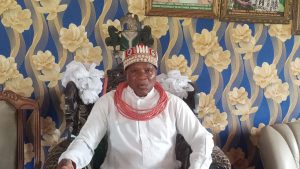
However, some of the folks interviewed including the monarch of Etitioha Owaza, HRM Eze Nworgu; the PG of Owaza kingdom, Iheanacho; the Migrant School Headmaster, Nwanete, among others confirmed that oil bunkering has drastically gone down since the incumbent Gov. Alex Otti came on board, and gave hope and sense of belonging to the people. The Governor recently secured about 2000 hectares of land at Owaza for Abia Industrial and Innovation Park under a Public Private Partnership, PPP, arrangement. Government source confirmed that funds had been earmarked for payment of compensation.
Iheanacho said: “The state is giving us more recognition than the Federal Government especially since Gov. Otti came on board. He has given appointments to our sons unlike before. He is also building AIIP which will bring massive development and employment opportunities in Asa land. He has also pencilled the 11km Obehie-Umudiobia-Owaza Road for reconstruction. The Federal Government and oil companies should complement the efforts of the state.”
Our youths are only engaged as grass cutters, cleaners and gate men by oil companies.
The people also lamented that what they get from the oil companies in their communities is ‘insult and humiliation’ in the name of employment. While skilled personnel are hired from outside, the companies only recruit the indigenous youths for menial jobs despite the abundance of highly trained hands in the communities.
“We need better employment slots from the oil companies. What they reserve for few of our youths are menial jobs – cleaners, cutting of grass, gate keeping. It’s more painful when you realise that there is no amount of trained personnel that we don’t have among us. The companies prefer to bring their skilled workers from outside and they live in Port Harcourt. They only come here in convoy and go back after work. This is very annoying.”
As this Reporter visited one of the oil companies in the community, he ran into a young man (name withheld) working as an operator in a Flow Station. The worker who said he is a Ph.D holder in Mechanical Engineering, from the community, narrated the pathetic story of his underemployment.
He said: “The oil companies don’t offer us any tangible job. Imagine myself, I’m a Ph.D holder in Mechanical Engineering but I’m not yet a permanent staff in this Flow Station. I’m just an ordinary operator, and we have many of us here who are just operators. The company is just using us. Can you imagine that as a Ph. D holder, I don’t have any car? Look at my bike over there (pointed at a motorcycle parked in front of the flow station). Can you imagine the level of insult and marginalisation we receive here?
“The most annoying thing is that we are even the ones who teach the so-called skilled personnel they recruit from outside. After teaching them, their salaries are 100 times bigger than what we receive. We have the experience but they don’t recruit us as skilled personnel. There are so many of us here with the training and experience. Some of my brothers have spent 20 years here but we are still ordinary flow station operators. We have complained severally but nothing has changed. Most of the skilled workers here are from other parts of the company, mainly the North.”
According to him, the oil companies should even engage the locals who do not have university qualifications but possess the experience in oil and gas exploration.
“They should even train the youths and employ them instead of allowing them to be roaming around.”
Women seek recognition, empowerment
The women folk also have their share of marginalisation, and expressed dissatisfaction over their alleged exclusion from the oil money.
The women leader in Owaza Community, Mrs Blessing Nwele who is a Headmistress in one of the primary schools in the area, expressed bitterness over the neglect of women in the scheme of things.
She particularly lamented the poor condition of the Owaza Cottage hospital since the exit of Shell, saying that the cost of Medicare particularly child birth in private medical facilities, is becoming increasingly unaffordable.
“We need skills acquisition centres to train our women in different locations. Many of us here are graduates but without jobs. Our own degrees here end in the kitchen. We need standard markets here. The worst is that if you want to be delivered of your baby, your husband pays through his nose at private hospitals because the cottage hospital is no longer functional.
“The oil companies should employ us and our children and husbands. Not as gate men and cleaners but as skilled staff. They should stop giving us two cups of rice at the end of the year but bring enough quantity that each family can get up to one bag. They should give women their own rice to share and not lump it together. They should empower our women because the oil has destroyed our farms. We now buy garri from the market even though we are in rural communities. We are now suffering because of oil that God gave us.”

Meanwhile, the allegation that NPDC no longer shows interest in the cottage hospital since it took over from Shell, was confirmed by a staff of the oil giant. The staff who did not want to be disclosed, said: “It’s not an allegation but a true fact. NPDC has neglected the hospital. It no longer fulfils its obligations of the MoU.”
Some of the locals expressed pain that instead of the skilled workers of the oil companies to live in the host communities, they operate from the neighbouring Rivers State, thus denying the communities of the socio-economic effects of the presence of the workers and their families.
“You see them enter here in convoys and drive back to Port Harcourt in the evening. This is not fair to our local economy,” the Owaza PG lamented.
The paramount monarch in Owaza, HRH Eze Nworgu, however, acknowledged that NDDC had commenced road rehabilitation in the community due to pressure from Gov. Otti. He also urged ASOPADEC to show more commitment in the area.
“Oil in our land is a blessing but we’re not enjoying it,” the monarch lamented. On whether the oil companies make financial commitments he said: “What they give us here is peanut. They will promise to build water project or skills acquisition centre for the people but at the end of the day you won’t see them. We don’t yet feel their impact.
Decrying the devastating effects of oil exploration on their environment, the monarch said: “before, we had cassava, plantains and pineapple and corn in large quantities but now oil has destroyed everything. Our streams are polluted. Before now if you enter this palace by this time there would be fresh fish here but the aquatic lives are gone. What we have now is environmental degradation. I have been on the throne for nearly 28 years but go round my palace and check if I look like a king of an oil-producing community.
“We need federal institutions and companies to create jobs for our youths. The Federal Government should come to our aid. All the agencies including NDDC and ASOPADEC are not caring for us. Our schools are dilapidated with leaky roofs. We thought the oil will be a blessing but now we have discovered it is not.”
However, ASOPADEC admitted that the agency had not done much to touch the lives of oil-producing communities in the past but the narrative under the current administration in the state had started improving. Chairman of ASOPADEC, Venerable Joshua Onyeike, in an interview, said the agency was making spirited efforts to address the issues being raised by the people.
He identified paucity of funds as a major impediment of the agency which he said was over populated by past administrations, and was battling to pay staff salaries. The ASOPADEC boss who enumerated some of the projects already executed by the agency, appealed for calm as efforts were being intensified to tackle the challenges of the people.
“I will agree with them that before now, there was no project you can point at and say ASOPADEC executed in the past but with the one year and five months of the current administration, we have started doing something.”
He enumerated some of the projects delivered under his watch in Ukwa land to include: completion of Asa civil centre at Obehie; building of quarters for nurses at Owaza Cottage hospital, 1.2km Ogumini Road at Obehie, construction of 100 stalls at Obuzor market, 5-classroom block at Owo-Asa primary schools, water project at Umunteke, Umuebuchungwu, and Iku and Owaza.
He further said that the agency runs annual scholarship scheme where over 144 students including people from oil producing communities are beneficiaries. The ASOPADEC boss who incidentally hails from the oil-rich Asa kingdom, appealed to his kinsmen to exercise patience, cautioning against over expectation.
“Rome was not built in a day. They should not expect me to use money for other things to do unnecessary patronage. They should not expect me to behave like my predecessors paying hotel bills for them and giving them money occasionally. They should not also expect that I should use my personal money. It’s the much we receive from Government that we will deploy.
“The government before us over-bloated the agency with staff. We are paying over 700 staff, and our wage bill is over N40 million. We are owing a lot of contractors, and just cleared the 5 month salary arrears owed by past administration. We don’t have enough money. We get little because the law establishing ASOPADEC only approved for us, 30% of the 13 % Derivation Fund coming to the state. The state controls the rest.”
Efforts to get a response from NDDC were unfruitful. One of its Public Relations personnel simply known as Mr Sam said the member representing Abia State in the NDDC Board, Chief Dimgba Eruba, was in a better position to respond to the inquiries. He promised to volunteer his contact but never did many days before this publication.
Meanwhile, the Commissioner for Environmental, Mr Philemon Asonye Ogbonna, noted with concern the negative impacts of oil exploration on the environment. He, however, said the Ministry was engaging the oil companies for necessary corrective actions.
“We interface them (oil companies) to realise the negative impacts of their activities; how the lives and culture of the people are affected. We make them develop policies that can ameliorate these negative impacts.”
He, however, said the responses from the oil companies were not enough.
“They are not fully meeting the demands of the people. They should have well developed corporate social responsibilities to cushion the effects of these harmful activities on the people. So, they should do more because the impacts are predominantly serious on the lives of the people. It affects their livelihoods. Their agricultural yield is very low.”
Asked if the state was considering any sanctions against defaulters, he said: “The issue of sanctions is a national issue and the state will not develop its own. But as a Ministry, we will do our best to bring their attention to the challenges.”
On the efforts to ensure that oil companies in the state stop environmental pollution, and are alive to their corporate social responsibilities, the Commissioner for Petroleum said the Ministry had continued to engage them. He however, identified pipeline vandalism and illegal refineries as the greatest challenge of Government. He warned the perpetrators to stop the illegality, adding that a task-force has been established by the State to tackle the monster.
A commercial motorcycle operator from Rivers State operating in the Community also decried the uncaring attitude of oil companies operating in the area. The motorcyclist who was conveying this Reporter to a location in Owaza called Signboard, said the community would have been more developed if the oil companies showed enough commitment. “Go to Ahoada in Rivers State and see what two oil companies in the town are doing. Owaza also has two oil companies but has little to show for it ,” he murmured.
A source in one of the oil companies, however, blamed the elders of the oil-producing communities for the people’s ordeal. He wondered how they would be negotiating with oil companies alone without carrying their youths along. He said: “Their elders are the problem. How can they be negotiating with oil companies without carrying the youths along. Where is that done?”
Another local source blamed some bad eggs among the youths who have the penchant in vandalizing public utilities for some of the ordeals of the people. According to the source, the vandals and not Government, were to blame for plunging the communities into darkness for almost 10 years following the vandalism of power installations in the communities. He said they carted away the armoured cables for quick cash.
Attempts to speak with the oil companies were frustrated. Even after applying for a response to the inquiries, no response was elicited as at the time of filing this report many days afterwards.
This Report is part of activities by the Ikenga Media & Cultural Awareness Initiative (IMCAI) under the Collaborative Media Engagement for Development Inclusivity and Accountability Project, a multi-level intervention for media independence and government accountability, managed by the Wole Soyinka Centre for Investigative Journalism (WSCIJ) and supported by MacArthur Foundation.

